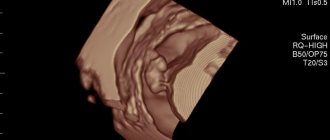If the unexpected happens and the baby has to be born at this time, doctors assure that he has a chance to survive. Immediately after delivery, the baby will be placed in a machine that provides artificial respiration. The fact is that the fetus’s lungs at this stage are not fully formed, and accordingly, he will not be able to breathe on his own. The same can be said about the digestive organs. Even if doctors manage to save the child’s life, he will not avoid major health problems in the future. Therefore, the mother needs to be careful and prevent his premature birth.
Baby movements at 22 weeks
Every day the child becomes more and more active. As mentioned above, with the rapid development of the central nervous system and the improvement of the brain, the fetus can make controlled movements: roll over, somersault, kick, tap on the wall of the placenta. And all this is fully felt by the expectant mother.
The child's movements cause indescribable delight in the mother and father. This also becomes reassuring for them, because fetal movements indicate good health.
Body changes and new sensations for women
The problem for some women in the second trimester may be excessive sweating - hyperhidrosis. The main causes of hyperhidrosis at week 22 are hormonal changes and an increase in the volume of fluid in the pregnant woman’s body due to increased uteroplacental blood flow. What should an expectant mother do to reduce sweat production and eliminate unpleasant odors? Choose bedding and clothing only from natural materials - synthetics are unacceptable for hyperhidrosis. Avoid coffee and spices - they can increase sweating because they have a stimulating effect on the central nervous system. Take a shower as often as possible, spend more time outdoors and be sure to ventilate the room in which you sleep. Read about the use of deodorants and antiperspirants during pregnancy below in our “Beauty and Accessories” section.
How the baby develops at 22 weeks
We continue to study the possibilities of baby development before birth.
The organ of hearing picks up vibrations quite early, but the brain is able to transform them into sounds familiar to us no earlier than the second half of life before birth. And from now on, hearing becomes one of the main suppliers of signals from the external environment to the Baby’s brain.
The acoustic background in the uterus is quite powerful, approximately 60 decibels. It includes the mother’s heartbeat, rumbling in the stomach, and the movement of blood in the vessels. You are in approximately the same background when you are surrounded by a noisy, discordant company. However, even despite this noise, the sound world in which the Kid lives for the time being creates a feeling of security in him.
How does your baby manage to hear the sounds of the outside world? And what sounds can he hear? Of course, those that drown out the noise of your body. Before reaching the Baby's hearing organ, the sound wave must break through the layer of muscles on the abdomen, the walls of the uterus and amniotic fluid. All sounds from the outside world seem deaf to a child before birth, because his hearing is most sensitive to low tones. This means that the baby will listen to daddy’s voice with pleasure and quickly recognize it.
How does your baby hear your own voice? When you speak, powerful sound waves travel through your bones and through your spine and pelvis to your Baby. Moreover, the pelvis serves as a kind of amplifier of the sound signal: with the sounds of a female voice in the range from 2500 to 3000 Hertz, its arches begin to resonate at the same frequency. This means that your child not only hears your voice, but also... feels its vibration!
So, we can carefully influence the Baby’s hearing for his overall development.
Lifestyle
At week 22, it is necessary to regularly unload the spine and strengthen the back with the help of special gymnastics for pregnant women. Here are some simple and safe exercises:
- Place one hand on your pubis, the other on your tailbone and gently move your pelvis back and forth for 2-3 minutes. Do the exercise several times a day.
- Get on all fours with emphasis on the palms of your hands and knees. Extend your right leg and make one circle with it, mentally counting to eight. Do the same exercise with your left leg.
- Sit on a fitball, straighten your back, put your hands on your hips, place your feet shoulder-width apart. Make circular movements with your pelvis on the ball - 5-6 “turns” in each direction.
If you feel unwell during exercise, immediately stop exercising, lie on your side and try to relax.
Good to know
How does weight change during pregnancy?
Singing before birth. About methods of musical improvement of the unborn child
How a pregnant woman can cope with stress at work
Ten phrases that irritate pregnant women
Heartburn during pregnancy: how to get rid of it? 4 ways to prevent heartburn
How to treat hemorrhoids in pregnant women
Medicines for hemorrhoids during pregnancy
Why do you crave salty foods during pregnancy?
Professor I. Kon about healthy eating during pregnancy
All texts for pages about mother and baby were kindly provided by RAMA Publishing - these are chapters from the book by Svetlana Klaas “Your Favorite Little Man from Conception to Birth”, reviewer Irina Nikolaevna Kononova, Candidate of Medical Sciences, Associate Professor of the Department of Obstetrics and Gynecology of the Ural State Medical Academy (Ekaterinburg).
Beauty and accessories
Can I use deodorants and antiperspirants during pregnancy? Doctors recommend that women use natural deodorants - they do not contain alcohol, fragrances, aluminum salts or chemical additives, and therefore are absolutely harmless. Alum stone or alunite will also help get rid of unpleasant odors. This safe natural deodorant mineral blocks the activity of various microorganisms without leaving any traces on the body, while the sweat glands continue to work as before. As for antiperspirants, doctors do not allow treating areas of the skin with them during an “interesting situation” - they narrow the sweat ducts, thereby undermining the functioning of the kidneys and provoking the development of a variety of ailments and unpleasant sensations in pregnant women.
Tests and studies during pregnancy
Visiting a doctor monitoring pregnancy: once a month.
Weighing, measuring blood pressure, measuring the height of the uterine fundus, listening to the fetal heartbeat. General urine test - before each visit to the doctor. Indicates the quality of kidney function.
Visiting specialists: therapist, ophthalmologist, otolaryngologist, dentist.
ECG (electrocardiogram).
Hormone analysis - according to indications .
Nutrition
Nutrition of a woman at 22 weeks
The nutrition of the expectant mother has a significant impact on the development of the fetus. The amount of incoming nutrients, the favorable course of pregnancy and the health of the parent herself depend on how a woman eats. It is recommended to be careful about your diet and adhere to the principles of a healthy diet.
Every day a woman’s body should receive:
- dairy products;
- vegetables and fruits;
- meat;
- dried fruits and nuts;
- porridge (buckwheat, brown rice, oatmeal);
- wholemeal bread;
- chicken eggs.
When preparing and eating food, it is recommended to follow some tips:
- cook by steaming, in the oven or in a slow cooker with minimal use of salt. Avoid fried, smoked, heavily seasoned, pickled foods.
- eat the simplest possible dishes, avoiding mixing a large number of different ingredients;
- eat often, in small portions. It is ideal to eat 5-6 times a day;
- when drinking juices, dilute them with water 1:1;
- replace sweet baked goods with dried fruits;
- Monitor sufficient fluid intake. Unless otherwise prescribed by your doctor, drink about 2.5 liters per day;
At week 22, many women note a constant desire to eat. It is not advisable to give in to this. The catchphrase “eating for two” does not imply an increase in food, but an increase in the amount of nutrients necessary for the normal functioning of the mother’s body and the development of the fetus. If it is impossible to resist eating, then it is advisable to pay attention to raw vegetables and dried fruits, and not to sweets and starchy foods.
Vitamins
It is recommended to take vitamins and supplements during the 22nd week of pregnancy under the supervision of a gynecologist. If you feel that the body is lacking some elements, it is not advisable to make a decision on your own to take a vitamin complex or a separate type of useful substance. It is advisable to undergo additional tests and confirm suspicions by consulting a gynecologist. Before this, try to create a diet containing the right amount of nutrients and vitamins. It is advisable to use chemical additives as a supplement to the main diet, and do so carefully.
Uncontrolled use of vitamin complexes during pregnancy can harm the health of the woman and the unborn child and contribute to rapid weight gain.
Vaginal discharge is normal
At this stage of pregnancy, the nature of vaginal discharge practically does not change - it is still light and translucent, without an unpleasant odor. If a woman detects inclusions in the discharge that look like cottage cheese, a change in their color and structure, it is quite possible that she has vaginal candidiasis or a bacterial infection. It is necessary to immediately take a smear for urogenital infections to prevent the penetration of pathogenic microorganisms from the vagina into other parts of the reproductive system. Vaginal candidiasis is quite common in pregnant women. This is explained by the fact that local and general immunity decreases during pregnancy, which leads to the activation of the fungus and its proliferation.
Treatment of thrush does not take much time when both partners undergo antifungal therapy at the same time. There are effective drugs for local and general action, specifically designed for the treatment of pregnant women. To prevent candidiasis from returning, you should not eat a lot of sweets, you should wear cotton underwear and carefully observe intimate hygiene.
Visiting an obstetrician-gynecologist
Visiting the doctor at 22 weeks
At the 22nd week of pregnancy, a woman may be scheduled to see a gynecologist. The day before you need to take a urine test. In some cases, the doctor asks the woman to take a general blood test, a sugar level test, and a biochemical blood test from a vein before the appointment. You can donate blood from a finger the day before, from a vein, preferably a week before the appointment, so that the results are ready.
During the appointment, the doctor will conduct a survey about your well-being and changes in sensations. It will measure blood pressure, body temperature, weight, abdominal volume, and uterine height. An examination on a gynecological chair is possible if it was not present at the previous appointment.
At the end of the visit, the gynecologist will set a date for the next appointment and give directions for the necessary tests.
During the meeting, it is advisable to ask the doctor all your questions and talk frankly about the changes that have occurred. At the 22nd week, pregnant women are prone to forgetfulness and absent-mindedness, so it’s a good idea to write down all the questions in a notebook or on a piece of paper in advance.
Ultrasound
At week 22, in rare cases, it is possible to conduct a second screening (ultrasound) to identify possible pathologies in the fetus. During the examination, the specialist will assess not only the condition of the unborn baby and the compliance of its parameters with the term, but will also examine the uterus, placenta and umbilical cord. If deviations from the norm are detected, additional invasive research methods may be prescribed.
In most cases, an ultrasound scan at the 22nd week of pregnancy is prescribed for special medical reasons if there is a suspicion of unwanted changes.
Uterus and belly
This week, the fundus of the uterus is 2 cm above the navel. Its height is about 26 cm when carrying one fetus; during a multiple pregnancy it can reach 34 cm. The size of the uterus increases in all directions, the abdomen becomes slightly larger.
From the 22nd week, training contractions may appear. The muscles of the uterus begin to prepare for delivery and try to contract painlessly. At such moments, the stomach is tense, the woman feels a little discomfort. If pain occurs, you should immediately seek medical help.
Pain in the abdomen and other parts of the body
At the 22nd week of pregnancy (according to obstetric calculations), pain may appear in different parts of the body. It is advisable for a woman to know the possible causes of such manifestations in order to take the necessary measures in a timely manner.
Abdominal pain
This week, the occurrence of pain of any kind in the abdomen is a reason to immediately seek medical help. If you experience discomfort without pain, you should consult a gynecologist.
Backache
A common companion for pregnant women at the 22nd week is back pain, localized in the lower back. In most cases, it is caused by weight gain and a shift in the center of gravity. The tummy is already quite large, the woman’s gait has changed, it is often called “duck”. This leads to increased stress on the spine. Fatigue of the muscles of the spinal column causes pain. Wearing a prenatal bandage and comfortable low-top shoes helps reduce the load on this area of the body.
If back pain is localized on the sides and has a shooting character, you need to take a urine test and consult a gynecologist.
Headache
The most common cause of headaches during this period is changes in blood pressure. A decrease or increase in indicators is a reason to consult a gynecologist. A pregnant woman's blood pressure should be no lower than 100/60 and no higher than 140/90. The exception is women who were diagnosed with hypotension or hypertension before pregnancy. They are at risk, and a change of 30 points from the working pressure is considered dangerous. For example, if before pregnancy a woman usually had a blood pressure of 130/80, and she felt well, then readings of 160/110 would be dangerous.
In rare cases, headaches this week can be caused by:
- physical fatigue after playing sports;
- violation of the drinking regime;
- lack of sleep.
If blood pressure is normal, it is necessary to identify the cause of the pain and try to avoid negative factors, and then report it to the gynecologist.
Leg pain, cramps
Painful sensations in the legs during pregnancy can be caused by various factors:
- lack of calcium;
- phlebeurysm;
- physical fatigue;
- swelling, etc.
Finding out the causes and prescribing treatment is the task of the gynecologist. If pain in the legs occurs, it is advisable to consult a doctor, avoiding the use of folk remedies until an accurate diagnosis is established.
Discharge
Vaginal discharge usually does not change at 22 weeks of pregnancy. Normally, they should be light milky or colorless, practically odorless. Any change in color, consistency or smell is a reason to consult a gynecologist for advice.
In rare cases, leakage of amniotic fluid may occur during the 22nd week of pregnancy. This is a dangerous situation that is important to notice in time. If a woman finds that the discharge has become watery, she should urgently contact a gynecologist.
Bleeding and menstruation
There should be no blood or menstruation coming from your vagina this week. If spotting or bleeding occurs, you should immediately seek medical help to identify the cause. In most cases, such a manifestation at this stage is a sign of pregnancy pathology, requiring careful monitoring by doctors, possibly treatment or additional research.
Movements - what's new?
At this stage of pregnancy, a woman has already learned to distinguish by the nature of her movements whether the baby is sleeping or awake. Often he moves actively just when the mother is about to rest or during a night's sleep. If a child makes a series of sudden movements, perhaps he does not have enough oxygen, and in this way he is trying to activate his cardiac activity.
If movements are not felt throughout the day, it can be assumed that the course of pregnancy has taken a negative turn and it has faded. You should immediately consult a doctor about this problem.










